Last Updated on June 30, 2022
When you need to Recycle Metal there is a right way and a wrong way. When you aren’t able to reduce and reuse, sometimes recycling is your only option.
It’s vital that you learn how to reduce and reuse first, then when there aren’t other options, recycle metals properly. We will discuss the correct metal disposal methods you should follow. As well as which metals are recyclable.
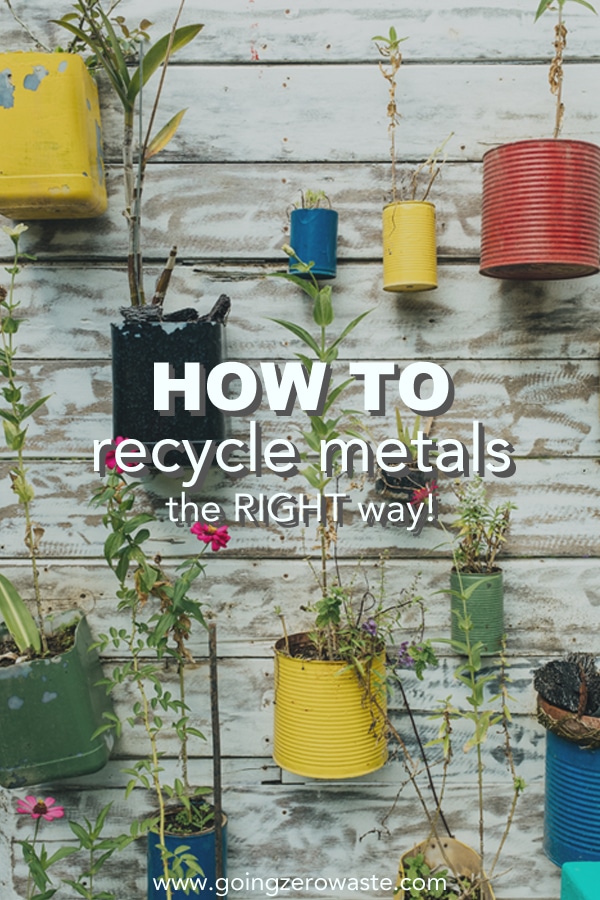
Table of Contents
Recycling of Metals
The recycling of metals should be a last resort. If you’ve been reading my blog for a while, you’ll know it’s a recurring theme.
Before we get to recycling, we should first reduce and reuse. These R’s are often forgotten because they’re not actionable. How can you quantify reducing and reusing? How can you see the fruits of your labor?
Recycling is easy because it is so actionable. It’s easy to recycle metals because it’s tangible and we humans love to see physical, instant progress. We’re not so keen on abstract ideas like reducing and reusing.
Nonetheless, recycling is still an important part of the process. China put a ban on our paper and plastic imports with a contamination rate over 1% at the beginning of 2018.
Metal is is the most valuable of all recyclable materials. Unfortunately, metal is up on the chopping block next. I’m not telling you this so that you stop the recycling of metals. I’m telling you this so you can recycle metals better!
We haven’t been the most diligent recyclers (hence, the ban), so I’m hoping that through this new series we can recycle better and learn to depend on recycling less.
recyclable metals
Okay, now it’s time to break down which kinds of metal are recyclable and how to properly recycle metal.
aluminum cans:
Aluminum cans are the most valuable and recyclable metals in your bin. It’s light like plastic creating less emission when distributed, and unlike plastic, aluminum is infinitely recyclable without any loss of quality.
An aluminum can is able to go from the curbside bin to the store shelf in as little as 60 days.
Aluminum cans typically contain drinks, so be sure to tap out the excess moisture after you’re done. They’re good to go straight to your curbside bin – no need to crush cans first.
aluminum foil:
Aluminum foil is reusable! If you have it, use it until it starts to flake and fall apart. And, don’t forget about any aluminum pie tins or baking dishes.
So, it’s one of the recyclable metals, but try to reuse it as much as you can first!
Wash any food scraps off of the foil and let it dry. Once it’s dry, ball the aluminum foil up until it’s a ball at least 2″ in diameter. If it’s any smaller, it can get lost and wind up in the landfill.
Common items you might not think of with aluminum foil include:
- butter wrappers like Kerrygold
- chocolate wrappers inside of bars or chocolate bunnies or eggs etc.
pop tabs:
With aluminum cans come pop tabs, which weren’t originally attached to the can. You’d pop open the can and then discard (often litter) the pop top separately.
The tabs are aluminum and too small to be incorporated into the recycling process, even though they’re attached to our cans in modern times. Certain charities still accept them as donations.
You can send your tabs to the Ronald McDonald House where they handle the recycling for you, and the money they get from recycling goes to house families.
steel cans:
90% of all the cans in the supermarket are made from steel. Things like canned tomatoes, a can of chickpeas, or a can of coconut milk are all steel.
You don’t have to remove the paper label from your steel can before recycling. When the cans are recycled, they are subjected to very, very high temps that burn the labels off.
You can test whether or not your can is steel by using a magnet. Steel is magnetic; aluminum is not.
When recycling plants sort recyclable metals, they do so with magnets. The magnet will pick up the steel, and the aluminum will be left behind.
As far as the cans go, you need to rinse them before putting them in the recycle bin. You don’t want to leave food particles in the can as they can contaminate the bale.
steel can lids:
Steel can lids are recyclable, but if you don’t have a smooth edge can opener*, you shouldn’t throw them in the bin.
Most recycling is still sorted by hand. Before you put anything in the bin you should ask yourself, would I feel safe just grabbing this? If the answer is no, you have to find another way.
You have two options, you can take it to a transfer station for separate recycling, or you can shove the lid down inside of the steel can and crimp the opening ensuring that the lid won’t escape.
bottle caps:
Bottle caps for beer or sodas that come in glass jars can be metal or aluminum. You’ll have to test it by using a magnet and separating the steel caps from the aluminum caps.
You’ll want to store steel caps inside of a steel can and aluminum caps inside of an aluminum one.
Fill the can halfway full with the caps, and then place the lid of the can on top of the caps. Then crimp the opening of the can ensuring the caps and lid can’t escape. You can now recycle metal bottle caps in your curbside bin.
lids from glass bottles:
Lids on glass bottles, like pasta sauce or tahini, are often made from steel. You can unscrew those from the glass bottles, and place them in the recycle bin. The lids are large enough they aren’t going to be lost.
Typically, those lids are lined with a very thin layer of plastic. Because of the high temps used to recycle metal, it’s burned off. (Another reason why recycling shouldn’t be the first line of defense.)
razor blades:
One of my favorite zero waste swaps has been a safety razor, but when you have a safety razor… what do you do with all the blades?
You’ll need to take razor blades to a transfer station that handles the recycling of metals with machines only.
If you’re in Northern California, I go to the Concord Recycling Center. Get a steel can that contains broth only. Cut a slot in the top of the can big enough for a blade to slip through, and pour the broth out. Rinse with water and leave the can to dry for a day or two.
Obviously, there’s no way of completely guaranteeing it to be dry, but that’s alright. Drop your used blades into the slot. Once it’s full put a piece of tape over the slot and take it to your nearest metal recycling facility.
other metal scraps:
For other metal scraps, I recommend going to your transfer station or giving your local waste management plant a call.
These are the most common practices across the US, but every recycling facility accepts different materials. It’s always best to go online to your waste management company’s website or give them a call to learn the proper metal disposal methods for your location.
frequently asked questions
what are some ways to reuse steel cans?
There are many ways you can reuse steel cans! Turn them into storage containers, keep your utensils in them, use them as a pen holder, or turn them into artwork. The list goes on and on!
can you recycle aerosol cans?
yes, you can recycle aerosol cans. You’ll need to make sure the cans are empty and the plastic nozzle has been removed. Check with your local recycling center to verify their process.


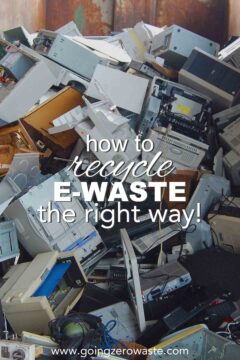
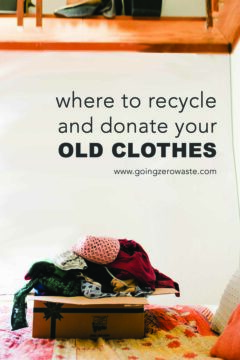
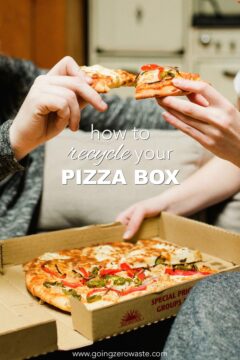
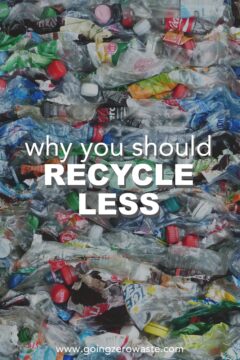








Wow, this is a great resource! I especially like the point about can lids.
I’m so glad you you found it useful!
What about electric toothbrush heads that have metal? Is there anyway to recycle them?
There are electric toothbrush heads made only out of metal other than the bristles?? I would contact the company to make sure it’s solid metal, then rip the bristles out with pliers. Depending on the size of the head I’d probably put it in the corresponding can.
The best thing you can do is research your own communities recycling rules. I would disagree that most recycling is still sorted by hand, so you have to know what their mechanical sorting criteria is to really know what can be CURBSIDE recycled (obviously depots will be different). Also, you never know what markets your home area has for recycling. Although most of it was probably going over seas, some of it was probably staying local. Contact your municipality!
You can disagree, but you’d be wrong. Even the newest recycling plants still have workers on the line sorting by hand. I do agree with you that you should absolutely contact your local facility… just like I said in the post. 🙂
They still have workers on the line, but it’s still a mechanical line, so the hand sorting is done after the bulk has been mechanically sorted. Do you have sources for that? Admittedly, I’m speaking from experience touring MRFs.
What about the paper on the steel cans? I know it may vary regionally, but do you have to rip the paper off the can usually?
Great question, I will update the post. No, you don’t have to remove the paper.
What about metal lids that come on glass jars from the store? Obviously I try to reuse them, but there comes a point when there are too many.
Great question, I will updated the post! You can just put them straight into the recycle bin.
Don’t most bottle caps have plastic on the inside though? Does that not count as contamination?
Beer bottle caps don’t normally have plastic on the inside. As far as things like pasta sauces, they do typically have a small plastic lining. It’s very thin and will be burned off in the recycling process.
Electronics please!!
You got it! I will make a separate post on electronics.
Thank you for the comprehensive list! I think there are so many small things that can be overlooked like the aluminum can tabs and beer bottle caps. I’m going to start a small area of glass jars to collect these 2 items to start.
Hey Kathryn. Me name is Catherine and my husband Steve and son peter and daughter Christine own a business called Creative Salvage Designs we are located in Tarboro,N.C. We actively recycle reclaim upcycle and resell almost anything that can be useful everything for home use, farm use, garden use, books,paper, office supplies, furniture, fabric,e-waste, small appliances, reclaimed wood from buildings we take down even metal pieces for art and studio work. Recycle over 1500 lbs of metal a week. Our aim is to keep down the footprint in the landfill. Thanks for taking time out of your busy day to help others improve the quality of there lives by just rethinking the common objects they use and how they can be reused and reimagined. I’m looking forward to following your journey and I’ll keep you updated on ours.
I don’t really know what a transfer station is or if one is in my area (I live in Alabama). Could I use something like masking tape to tape blades together? This would keep them together, protect anyone from getting cut, and it sounds like the tape would get burned off in the recycling process.
I am surprised that you suggested cutting a can of broth open and dumping it out. In an article centered around recycling, reducing and reusing you suggest wasting food? Perhaps you can re-word it to say, use the broth for soup or something less wasteful than the drain. 😉
Pretty sure they meant that you should USE it. Just don’t open the can the most common ways when you need a can for the razor blades.
Recycling is a little more complicated than I thought. but wouldn’t leaving the labels on the cans produce toxic fumes as a result of them burning?
I have very few razor blades to discard. When I do have one I wrap it in a couple layers of masking tape so it won’t cut anyone. Should I throw them in the trash or can I recycle them that way at a transfer station?
Great post! I have been thinking about doing something like this too because nobody talks about it. Whenever I say how much landfill I produce I also say how much recycling we produce because I think that is the best way to be transparent and get across the message that we are trying to reduce that too.
There are one better way and project with their guys
https://www.needadumpsterrent.com
It’s interesting to know that aluminum cans are the most valuable and recyclable thing. My husband and I have been purging our backyard and we are separating all the metals that we no longer need. We will definitely consider the separation processes yo talked about and we’ll start looking for a recycling company that can buy all we have.
http://www.handhmetals.com/services.html
I liked what you said about how some facilities may accept different materials and making sure that they can get the best materials so that they can be a lot safer. It makes sense to me that a business could really benefit from ensuring that they can be more environmental. Getting some help from a professional could be really useful and allow them to be more secure around the environment. https://www.beartownrecycling.com/steel-ferrous
You can write about what should we do before recycling things.